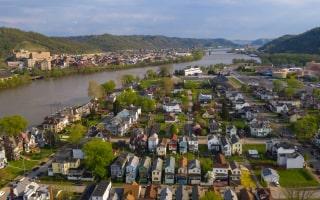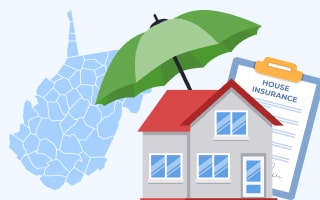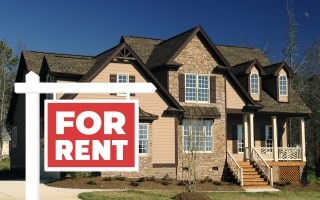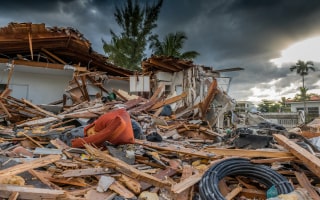Homeowners Insurance in West Virginia

West Virginia is a destination for those who enjoy exploring underground caves, visiting exclusive spas, and enjoying mineral water treatments. Located in the Southeastern part of the county, West Virginia can experience tornadoes, landslides, earthquakes, floods, and hurricanes, making it a potentially dangerous place to live where devastating property damage may occur. Since 1953, West Virginia has had 68 federally declared disasters, and the rate of disasters per 1 million people is 38.5.
Along with abundant claims for windstorms, earthquakes, and landslide damage, West Virginia residents also file many claims for floods, water damage due to faulty plumbing, liability issues, theft, vandalism, and fires.
Like all other states, West Virginia does not require homeowners insurance. However, agents and experts agree that anyone who owns property should have some. If you borrow money to buy a house in West Virginia, your lender will require you to purchase homeowners insurance and keep specific limits on it for the duration of the loan.
The national average for homeowners insurance is $2,728 yearly or $227 monthly. West Virginia homeowners pay an average of $1,444 a year, which is about half of the national average.
Types of Homeowner Insurance Coverage Available in West Virginia
Home insurance providers decide which states to set up shop in and what types of coverage to offer depending on the potential perils. West Virginia has quite a few severe natural disasters, and the available coverages in the state include:
-
Dwelling Coverage: Dwelling coverage pays to repair or replace your home after a covered event, such as a fire, windstorm, or tree damage.
-
Liability Coverage: If someone gets injured on your property and sues you, liability coverage will pay your legal bills.
-
Personal Property: Personal property coverage protects and replaces your belongings after theft or a qualifying event.
-
Medical Payments: When someone is hurt on your property, medical payments pay for their medical bills.
-
Other Structures: Other structures refer to fences, detached garages, sheds, pools, and other items. This insurance will pay to replace them after a covered peril.
-
Additional Living Expenses (ALE): Whenever you need to vacate your home during repairs or rebuilding after a covered disaster, ALE insurance will pay for you to stay at a hotel and pick up your other expenses (food, laundry, pet boarding, furniture rental, etc.).
West Virginia has a good amount of flooding annually, so you should also consider a flood policy. Also, consider an umbrella policy covering anything outside your normal limits.
FEMA (Federal Emergency Management Agency) manages the National Flood Insurance Program (NFIP) through a network of 50 providers across the U.S.
Since most homeowners insurance does not cover floods, this supplemental coverage can repair damage and replace items after a flood. Depending on the options you choose, it can cover the building and/or your personal belongings. This program is available to homeowners, renters, and businesses. Learn more about the program on FEMA's website.
Home Insurance and Natural Disasters
Climate change is rapidly leveling the playing field across the U.S. and raising rates to insurmountable figures. More frequent and severe natural disasters cause enormous property damage, claims, and losses for insurers. Over the past five years, rates have spiked by 34% and as high as 60% in some high-risk areas. In West Virginia, home insurance rates have risen by 8.8%, which is relatively low compared with the rest of the country.
West Virginia is prone to tornadoes, landslides, earthquakes, floods, and hurricanes, making it a risky state for homeowners insurance providers. From 1980 to 2024, West Virginia has had 45 billion-dollar disasters. Even one water and freezing claim cost insurance providers an average of $11,650. Floods cost an average of 4.6 billion a year nationwide. One claim for fire costs an average of $77,340, and hail and wind costs an average of $11,695. From 2015 to 2019, West Virginia insurance firms lost a total of $222,663,800.
How Can I Save on Homeowner Insurance Premiums in West Virginia?
Home insurance is necessary in states like West Virginia, and rates are constantly rising. Because of this, homeowners need to find ways to save. Some of the critical issues that impact home insurance costs are:
-
Location: The location of your home matters tremendously. If you live in an area prone to disastrous weather or high crime, you will pay more.
-
Size & Condition of the Home: Size and condition also come into play. The larger your home, the more you will pay. If the house is well-maintained, you will pay less than if it is in disrepair.
-
Age of the Home: The newer the home, the lower your premiums will be.
-
Level of Coverage: The more coverage you purchase, the higher your premiums.
-
Deductible: The larger the deductible, the lower the rates. Balance as high a deductible as possible with the coverage you need.
-
Your Credit Score: People with good credit scores earn lower rates than those with poor credit.
-
Claims History: If you have a lot of claims, even small ones, you will pay more as the insurer will see you as a high risk.
-
Additional Risks: If you have fireplaces, pools, or a hot tub, you will pay more for these "attractive nuisances".
Some ways to save on homeowners insurance include:
- Avoid Adding Risks: Even if your family clamors for a pool, only install one if you are okay with paying higher insurance bills.
- Bundle Your Insurance: Bundle your insurance policies with the same carrier to get a discount on your insurance.
- Ask for Discounts: Ask your agent for any available discounts.
- Shop Around: Get multiple quotes before choosing an insurance provider.
- Raise Your Deductible: Raise your deductible as much as possible to pay less for your home insurance.
- Security/Safety Upgrades: Install a security system or add fire safety features to your home; your agent will drop your rates.
- Remain Loyal: Stay with the same insurance provider for many years; they should lower your rates over time.
- Rethink Small Claims: Don't file any small claims. Fix the issue yourself and wait to use your insurance until you really need it.
Home Insurance Discounts in West Virginia
Home insurance protects your home and property against specific perils. If something happens to your home, the insurance company will pay to fix or rebuild it. Homeowners insurance only covers qualifying perils (listed in your policy). It also covers liability, medical payments, personal belongings, and loss of use. All policies have limits, and nothing beyond those limits will be covered.
You can apply for a policy online using a provider's website, calling an 800 number, or visiting a local agent and speaking to them about coverage. Once you choose your limits, you must pay the first year in advance. After that, you can pay monthly through your mortgage escrow or once a year with a single payment.
Most insurance providers offer some type of discount. The most common offered are:
- Early Quote Discount: If you ask for a quote well before you need it, your provider could offer you a discount for being proactive.
- Senior Discount: Many firms offer discounts on home insurance to seniors of a specific age.
- Military Discount: Most insurance providers discount active military personnel and vets.
- Occupational Discount: Some professions, like firefighters and teachers, also get discounts.
- Claims-Free Discount: Stay claims-free for as long as possible to earn discounts from your insurance provider.
- Safety Discount: Make your home safer with a home security system to avoid theft, vandalism, and break-ins, and you could earn discounts.
- Bundling Discount: Bundle multiple policies together for a discount.
- Paperless Discount: Go paperless for your insurance statements, and your provider will give you a discount.
- Autopay Discount: Sign up for autopay and earn a small premium discount.
- New Roof Discount: Install a more storm-resistant roof, and your provider will give you a discount.
- Non-smoking Discount: Non-smokers have less fire risk and get lower rates than smokers.
- Smart Home Discount: Install smart home devices to make your home more efficient, monitor for disasters, and earn a discount.
- Green Discount: Install specific eco-friendly devices, and your provider may give you a discount.
- Fire-Safety Discount: Install sprinklers, smoke alarms, and fire extinguishers to earn a discount on your home insurance.
Common Rates Offer by Homeowners Insurance Firms
New homes cost far less to insure than older homes. This is because they are constructed of more robust, better, more fire-resistant, code-compliant materials. You can save up to 40% less on home insurance with a brand-new home and up to 26% less with a house five years old or younger. West Virginia homeowners pay an average of $900 for insurance, which is far less than the state average. Your actual rate will vary based on the firm you choose, your age, credit score, and claims history.
Top 10 Home Insurance Firms in West Virginia and Average New Home Savings
| Company | % savings |
|---|---|
| Nationwide | 76% |
| Travelers | 63% |
| USAA | 54% |
| Cincinnati Insurance | 52% |
| State Farm | 51% |
| Erie | 51% |
| Allstate | 47% |
| Liberty Mutual | N/A |
| Amica Mutual Insurance | N/A |
| Chubb | N/A |
Home Insurance and Renovations in West Virginia

Home renovations are a great way to completely transform your living space and add features or value, but they can also drastically impact your home insurance premiums. Some upgrades add space, value, or risk and may increase your rates. Others may reduce risk and make your home safer, thus decreasing your rates. Still others may have no effect at all.
![]() Home Renovations that Increase Rates
Home Renovations that Increase Rates
Some home renovations that increase your rates include:
- Luxury Upgrades: If you upgrade your kitchen with granite countertops, an expensive faucet, and luxury appliances, your home insurance rates will increase.
- Swimming Pool: While a swimming pool may be fun for the whole family, insurers view it as a risk, and your home insurance costs more if you have one.
- Solar Panels: Solar panels can help you save big on electricity, but they will increase your home insurance rates because they are costly to replace.
![]() Home Renovations that Decrease Rates
Home Renovations that Decrease Rates
Some home renovations that decrease your rates include:
- Make the Home Disaster-Resistant: Install hurricane straps or ties, impact-resistant shingles, and storm-safe windows (shatterproof), and your insurance rates should go down.
- Add a Sprinkler System: A sprinkler system can reduce fire risk and lower home insurance rates.
- Water Leak Detectors: Water leak detectors are a great, inexpensive way to prevent water damage and flooding from plumbing issues. It can also lower your home insurance cost.
If you replace your home's siding, you could reduce your rates, but unless you use luxury or expensive materials, which could actually raise them.
Homeowners insurance does not cover regular maintenance or selective upgrades. It only pays for repairs or replacement of a house after a qualifying event. If, during renovations, someone gets hurt or steals your stuff, those are covered by your home insurance policy. Home insurance does not cover pest infestations, rodents, mold, fungus, or animal damage.
You should always speak with your insurance agent before updating your home. Your agent can help you understand the full impact of the renovations on your coverage and rates and decide what, if anything, needs to change.
West Virginia Renters' Insurance

Renters in West Virginia who rent homes (condos, apartments, and houses) also need homeowners insurance, but it works differently. Renters insurance is different in that it does not include any dwelling coverage. However, it includes personal property and will pay to replace your belongings if they are destroyed in a qualifying event. Renters insurance also provides liability, medical payments, and loss of use coverage. Each policy has limits, and expensive items outside of those limits, like jewelry, furs, art, and collectibles, may not be covered. Some covered perils include fire, windstorms, theft, and vandalism.
Some of the items that renters insurance covers are:
-
Small Appliances
-
Furniture
-
Clothing
-
Bedding
-
Bath Items
-
Electronics
-
Sporting Equipment
Renters insurance is priced according to three main factors, and they are:
-
Location: Even as a renter, your location matters. If you live in the city, you will pay more than if you live in the country. If your area has many weather events, you will pay higher rates.
-
Coverage Amount: The more coverage you buy, the higher your premiums.
-
Number of Units: The more units in your building, the lower your rates.
West Virginia renters pay an average of $19 a month or $225 a year, which is on the high end of the national average of between $15 and $20 a month. City dwellers pay more (because of crime) than suburban or urban renters.
Condo Insurance in West Virginia

Condo insurance is specifically for condo owners. It's also known as HO-6 insurance and picks up where the condo association's master policy leaves off. Each condo development has its own "master policy", which covers replacing the dwellings and restoring them back to their original condition. Condo owners need HO-6 insurance to cover any upgraded materials and renovations (kitchens, baths, flooring, fixtures, appliances, etc.) made since they were built. Between the two policies, the condo should be restored back to its latest condition.
Unlike renters insurance, condo insurance does cover the dwelling (inside only). The liability portion covers only accidents that happen within the condo, not outside or on common property.
Condo insurance covers personal property, personal liability, personal injury, loss of use, and loss assessment. If your condo is destroyed by a fire, storm, or other peril, your insurance will replace the following:
- Furniture
- Fixtures
- Interior Walls
- Appliances
- Flooring
- Wiring and Plumbing
- Countertops
- Cabinets
- Personal Belongings
West Virginia condo owners pay an average of $255 a year or $21 a month, which is far less than the national average of $625 a year for $60,000 of personal property coverage, $300,000 of liability, and a $1,000 deductible.
Some ways to save on your condo insurance premiums include:
- Shop Around and Compare Prices
- Bundle Your Home and Auto Together
- Increase Your Deductible
- Look for Other Discounts
- Upgrade Your Home with a Security System
- Keep Your Credit Score High
- Avoid Small Claims
West Virginia Home Insurance Market
Unlike most states where the homeowners insurance industry is at risk, West Virginia suffered only one billion-dollar disaster in 2023, whereas bordering states of Kentucky and Ohio had seven. The West Virginia market as a whole has remained profitable over the past ten years. That means there are plenty of insurance providers to choose from, and residents don't have any issues finding the coverage they need.
West Virginia is a potentially risky state because of its many possible perils, such as tornadoes, landslides, earthquakes, floods, and hurricanes. If climate change continues to cause more frequent natural disasters, West Virginia's luck may run out, and insurers may start to see catastrophic losses and have to limit coverage or cancel some customers.
No federal agency regulates the home insurance industry. Instead, state departments regulate insurance providers within the region. They monitor rates and customer relations, ensuring fairness and legality. They also follow up on customer complaints and sanction guilty firms. In West Virginia, that agency is the West Virginia Offices of the Insurance Commissioner's Insurance Education Center, located at 1124 Smith St., Charleston, WV 25301.
Homeowners Insurance Guide
- Homeowners Insurance in West Virginia
- Types of Homeowner Insurance Coverage Available in West Virginia
- Home Insurance and Natural Disasters
- How Can I Save on Homeowner Insurance Premiums in West Virginia?
- Home Insurance Discounts in West Virginia
- Home Insurance and Renovations in West Virginia
- West Virginia Renters' Insurance
- Condo Insurance in West Virginia
- West Virginia Home Insurance Market
Instant Access to West Virginia Property Records
- Owner(s)
- Deed Records
- Loans & Liens
- Values
- Taxes
- Building Permits
- Purchase History
- Property Details
- And More!
Homeowners Insurance Guide
- Homeowners Insurance in West Virginia
- Types of Homeowner Insurance Coverage Available in West Virginia
- Home Insurance and Natural Disasters
- How Can I Save on Homeowner Insurance Premiums in West Virginia?
- Home Insurance Discounts in West Virginia
- Home Insurance and Renovations in West Virginia
- West Virginia Renters' Insurance
- Condo Insurance in West Virginia
- West Virginia Home Insurance Market